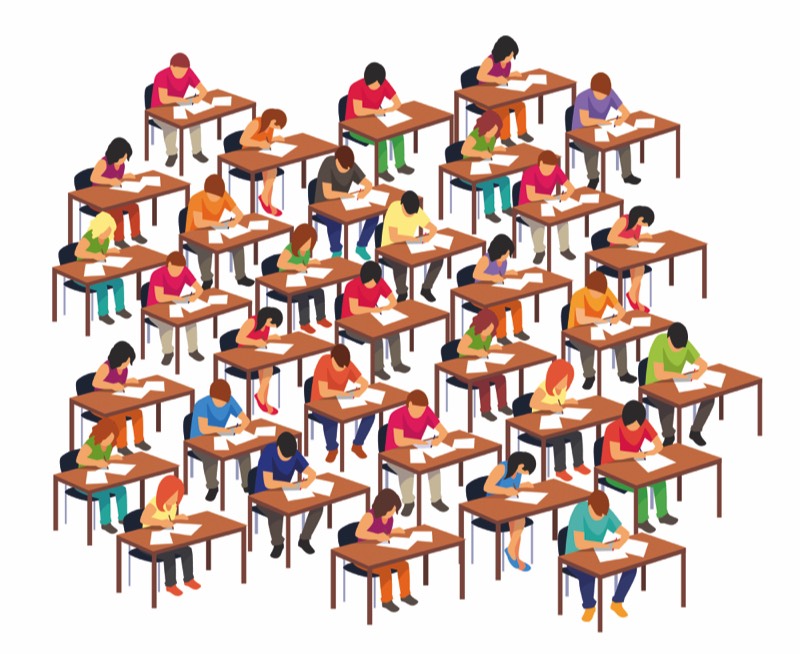EDUCATION
Surrey’s Premier Lifestyle Magazine
Education versus exams
Michael Connolly, Headmaster of Cranmore School, examines the issue of chasing assessment and examination results, and the effect it can have on a child’s overall education and wellbeing.

There was a time when schools were seen as institutions that nurtured children and provided them with an education. So what has changed? Increasingly articles in the media regarding schools focus on testing and exam results and, in particular, the stress they can create for children. This is not an entirely new phenomenon. In 2013, Professor Tanya Byron, a well-respected commentator on mental health for young people, raised her concerns in The Telegraph.
Professor Byron said some pupils at top schools in London experience so much expectation from schools and their parents to do well they have developed a fear of going to school. The cycle of constant exams and targets is leaving children “shattered by fear of failure,” and she says she is treating more young people for anorexia, depression and self-harm than ever before.
Two years earlier, in 2011, The Telegraph had already flagged what was becoming a significant problem: record numbers of students, aged 16-18, have already sought professional advice ahead of their exam results. Lucie Russell from YoungMinds, a charity which helps young people with mental health issues, said: “Every year we get calls from parents asking for advice on how to help their children cope with exam stress.”
Given this trend, which some commentators feel has become a crisis, the question is often asked: who is to blame?
It is true that schools must shoulder some responsibility. Ever since the introduction of league tables there has been an ‘arms race’ as many schools drive everything towards results at any cost to maintain their relative position in the hierarchy. Common sense tells us that such a culture cannot be beneficial for the pupils and nor is it compatible with the broader aims of education. Of course, in their defence, school leaders will state that this pressure for exam success is driven by the parents themselves who are too quick to grade a school based upon results rather than the wider educational attainment.
Professor Byron said some pupils at top schools in London experience so much expectation from schools and their parents to do well they have developed a fear of going to school. The cycle of constant exams and targets is leaving children “shattered by fear of failure,” and she says she is treating more young people for anorexia, depression and self-harm than ever before.
Two years earlier, in 2011, The Telegraph had already flagged what was becoming a significant problem: record numbers of students, aged 16-18, have already sought professional advice ahead of their exam results. Lucie Russell from YoungMinds, a charity which helps young people with mental health issues, said: “Every year we get calls from parents asking for advice on how to help their children cope with exam stress.”
Given this trend, which some commentators feel has become a crisis, the question is often asked: who is to blame?
It is true that schools must shoulder some responsibility. Ever since the introduction of league tables there has been an ‘arms race’ as many schools drive everything towards results at any cost to maintain their relative position in the hierarchy. Common sense tells us that such a culture cannot be beneficial for the pupils and nor is it compatible with the broader aims of education. Of course, in their defence, school leaders will state that this pressure for exam success is driven by the parents themselves who are too quick to grade a school based upon results rather than the wider educational attainment.
One hopes that the pendulum will eventually swing back so that schools can really concentrate on doing what they do best – giving young people a broad, stimulating education which prepares them for adult life. This is not to suggest that assessment and exams have no place in education. Of course, we must assess children to ensure they are making progress compatible with their innate abilities. Also, we want young people to be resilient when faced with challenges and this must include exams too. However, it’s clear there is an imbalance at present which is causing havoc by undermining the development and nurturing of children at school. The emphasis on exam performance has deterred many talented children from developing their skills in sport, music and drama as these pursuits can be easily marginalised in school.
What is the remedy? We need teachers to recognise that their primary purpose is to educate children which is not synonymous with jumping through exam hoops. Indeed, if we get the educational programme right by offering a balanced and engaging curriculum, we can be more confident that pupils will perform better in exams as a result.
At Cranmore School we take academic study very seriously and we ensure that pupils have the benefit of a broad curriculum. For example, our children study French, Spanish, Mandarin and Latin with many taking on Classical Greek too. However, a large part of their time is devoted to sport and music and it has been our experience that these two aspects of school life play a vital role in developing each child’s true potential.
In conclusion, I have some advice for parents who are in the process of selecting a school for their child. Do not be blinded by a school’s boasts about their academic profile in exams. Whilst that is obviously important, it is not the full story and one should investigate what ‘added value’ a school can genuinely provide in developing the whole child – this is something that first-class schools understand and do really well.
What is the remedy? We need teachers to recognise that their primary purpose is to educate children which is not synonymous with jumping through exam hoops. Indeed, if we get the educational programme right by offering a balanced and engaging curriculum, we can be more confident that pupils will perform better in exams as a result.
At Cranmore School we take academic study very seriously and we ensure that pupils have the benefit of a broad curriculum. For example, our children study French, Spanish, Mandarin and Latin with many taking on Classical Greek too. However, a large part of their time is devoted to sport and music and it has been our experience that these two aspects of school life play a vital role in developing each child’s true potential.
In conclusion, I have some advice for parents who are in the process of selecting a school for their child. Do not be blinded by a school’s boasts about their academic profile in exams. Whilst that is obviously important, it is not the full story and one should investigate what ‘added value’ a school can genuinely provide in developing the whole child – this is something that first-class schools understand and do really well.
essence info
With an impressive academic record, underpinned by strong pastoral care, Cranmore School is a community where each individual matters and pupils develop a long lasting love for learning. Children study the standard subjects as well as a stimulating curriculum which includes French, Mandarin, Spanish, Latin, Greek and a wide selection of extracurricular activities. The excellent facilities include a golf course, swimming pool, fitness suite and Forest School.Website: www.cranmoreprep.co.uk
Telephone: 01483 280340
The emphasis on exam performance has deterred many talented children from developing their skills in sport, music and drama as these
pursuits can be easily marginalised in school.

